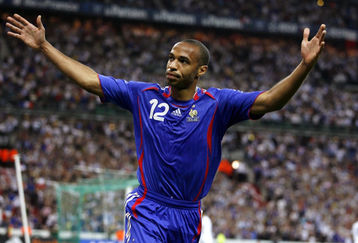
Through the years we have seen plenty of players with the ability to amaze us with their skill and tremendous talent.
Players like Zinedine Zidane, Diego Armando Maradona, Dennis Bergkamp, Pele, Roberto Baggio, Romario, Jurgen Klinsmann, Johan Cruyff, Franz Beckenbauer, George Best, Bobby Charlton, Zico, Ruud Gullit, Marco Van Basten, Georghe Hagi, Hristo Stoitchkov, and many more stand out from the rest with their exquisite skill.
But that brings us to the point where we could ask ourselves a few questions. What has really made them into the great players—legends, even—they are considered to be today? What does it take to be a legendary player? Is skill enough or is it something more?
In my opinion, it is the latter.
One factor that could be a catalyst in the development of a player’s career is his character. The character of footballers, as in real life, can either help the player gain fame, or bring him to his downfall.
We have witnessed cases in which a footballer with breath-taking skill has been booed by fans and hated by the media, simply because his character is somehow contradictory to the publicly accepted values.
I could not stress more the importance of a player’s loyalty towards a club or his country, as well. If a player is not loyal towards a club of his choice throughout his career, then that would surely damage his image with the public.
The same goes if a player is not loyal to his country. Even if he shows spectacular talent and skills he would still be looked at in doubt and disrespect.
A typical example of this is Nicolas Anelka, who undoubtedly has a tremendous amount of talent but his lack of loyalty towards any team, and his poor decisions throughout his career, remain the main reasons why he would never join the ranks of the greatest players.
Some people would ask how the lack of loyalty towards a club can really matter on the football field.
When the players are down there, it comes to being eleven versus eleven, and a ball. So how could a decision made by the player, who is not pledging his loyalty to a club, possibly affect him and his team on the pitch?
I think it matters exactly how you behave on that field. It is on that football field where you can see the real character of a man.
Nothing can be hidden there. The lack of loyalty or commitment can be easily seen on the football pitch. The state of mind of any of the players can also be easily sensed. At the end of the day, it comes to the things that really matter: your god-given skills and your way of using them.
Sometimes though, it is not that simple. Sometimes there are outside factors that could influence a player’s performance on the field.
The truth is that no matter how good a footballer may be at playing the game, he would always remain under the restrictions of how he should behave on the field and, indirectly, outside of it. Crossing those boundaries will further him from being accepted in any society, thus inevitably damaging the player’s career and reputation.
Do you remember Paolo Di Canio’s Fascist salutes? Do you remember Joey Barton’s misbehaviour on the field, or outside of it?
There are some things that a player, however talented, simply should not do, like attacking a fan, or behaving too aggressively towards his opponents or teammates. That would just damage the reputation of the player, no matter how good he is. It is never simple in the world we live in.
I doubt if a young boy who is making his first steps in football would want to become like footballers of such quality.
A legendary player has to have the necessary qualities to be an example for the next generations of footballers. He has to epitomize the ideal footballer, to which future talents will strive to become.
That can be achieved not only by having a unique and impressive style of play on the field, but also by showing a socially acceptable and admirable behaviour outside of it.
A great footballer has to burden himself with the responsibility that comes with being one.
He has to know that all eyes are turned towards him and in response; he must attempt to act as an example for younger players and future generations of footballers. Only then he can he become a legend.
Maybe that is why some footballers will never be legends. They would be remembered as just one of many others who possessed talent. Nevertheless, those who carry the responsibilities on their shoulders can never be forgotten.
Footballers such as Thierry Henry, Johan Cruyff, Pele, Bobby Charlton, Ferenc Puskas, Franco Baresi, Michel Platini, Dennis Bergkamp, Paolo Maldini and many, many more are footballers who will always be in the hearts of fans and the people who enjoy football.
This is not simply to the fact these people have raised the level of football from a practical point of view but they have also contributed to the improvement of the ethics of football.
They have put a mark on the world with their characters and have revealed to the younger generations a successful path to glory.

